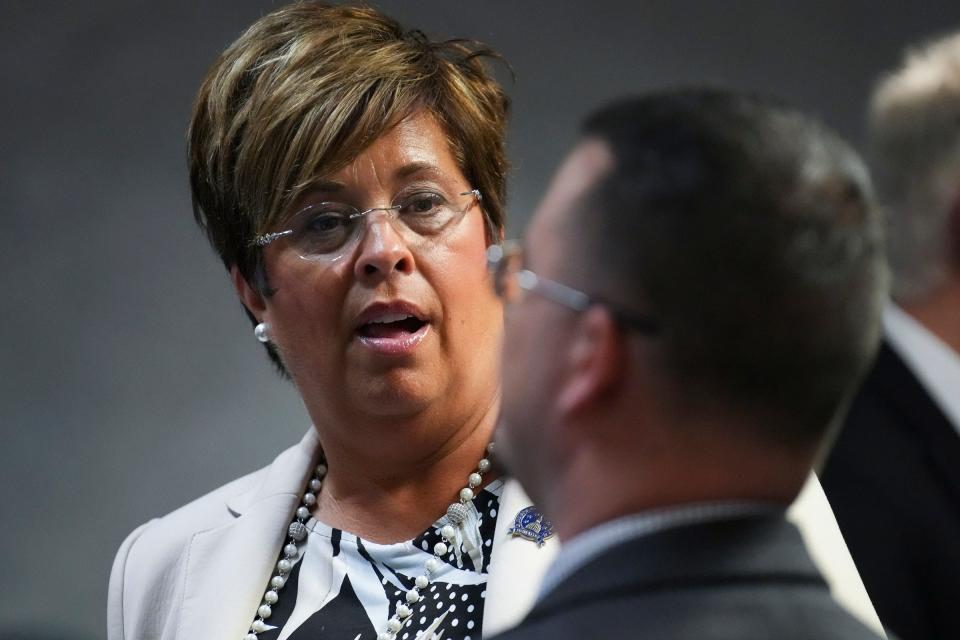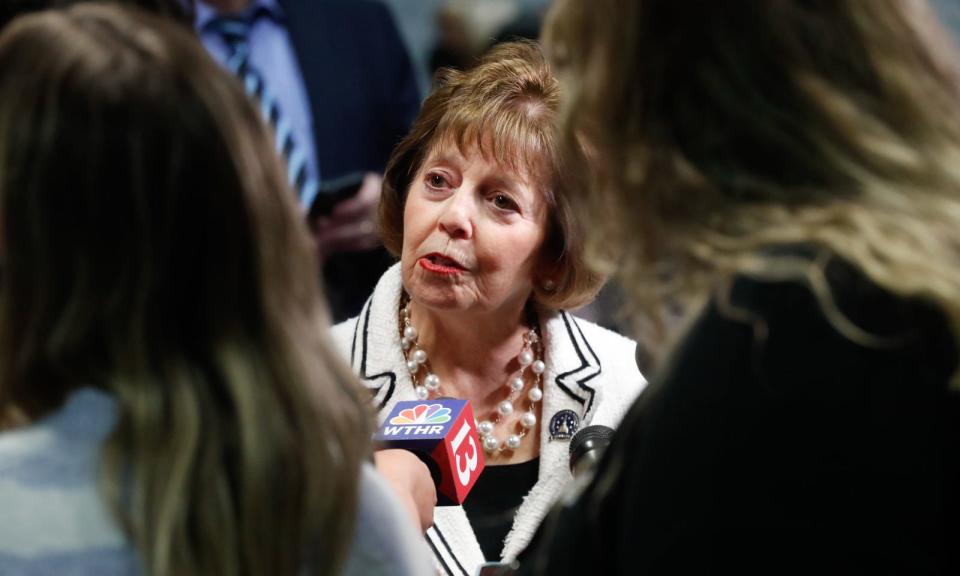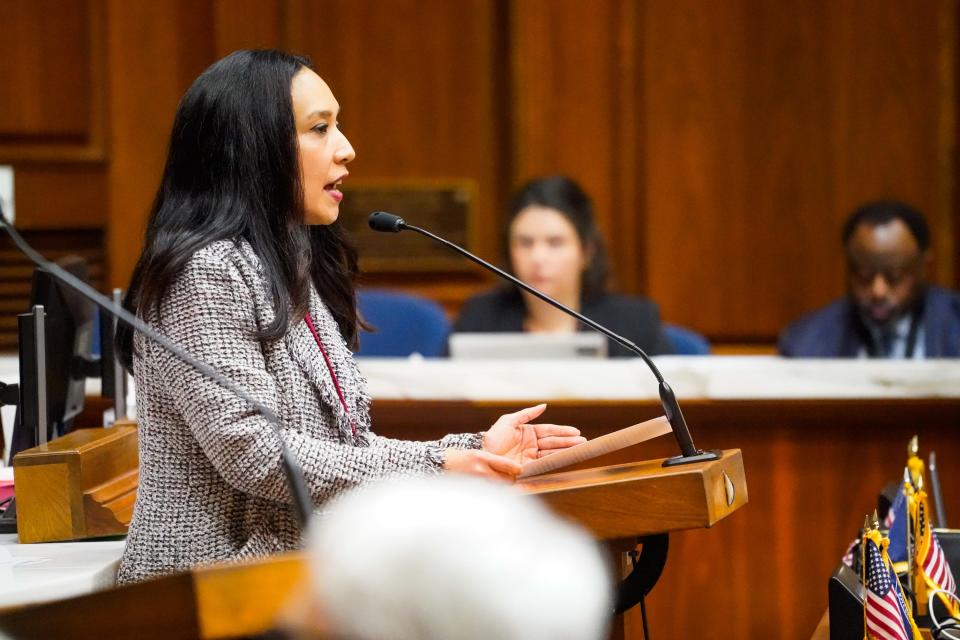State lawmakers' fights with Indy continue and more from 3rd week of 2024 session
Corrections and clarifications: A previous version of this story misquoted the term Rep. Ed Delaney used to describe Republicans' proposed alternative to the downtown economic enhancement district.
Indiana’s short 2024 legislative session is reaching a key point as next week is the last chance for bills to have committee hearings before they die. The House deadline is Jan. 30 and the Senate's Feb. 1.
Plenty of bills took big steps forward in the third week. Here are IndyStar's takeaways.
State v. local fights continue
The effort to repeal Indianapolis’ downtown economic enhancement district, a new property tax on Mile Square property owners to pay for public safety and homelessness initiatives that was inserted into the state budget last session, is moving on to the House floor.
Alongside the repeal bill, Republicans on the House Ways and Means Committee passed a different proposal that would allow the Indianapolis City-County Council to levy an income tax hike on all residents to pay for those Mile Square improvements.
On the Mile Square District: Indiana lawmakers want to repeal Indianapolis' special downtown taxing district
Democrats on the committee called out the political impracticality of this proposal but nonetheless voted for it, knowing it may end up being Indianapolis’ only remaining tool to raise funds to address the issue.
“This is what they call a Hobson's choice,” Rep. Ed Delaney, D-Indianapolis, said.
In other state vs. local fights: Sen. Aaron Freeman’s Senate Bill 108 nullifying Indianapolis’ no-turn-on-red ordinance was scheduled for a hearing Tuesday and was skipped over; on Thursday, Freeman inserted a compromise into his dedicated bus lanes bill through an amendment on the Senate floor.
The new language will allow the current signs to stay up but prohibit the city from adding more signs until at least July 1, 2025, when a task force would submit a study on their efficacy.
Religion and public education
Indiana lawmakers moved forward two bills this week that would test the boundaries between public schools and religion.
Senate Bill 50, written by Sen. Stacey Donato, R-Logansport, would allow school districts to hire a chaplain, or certified clergy member, to provide religious support to students after permission is granted by the student and/or their parents. School districts could also allow volunteer chaplains in schools at the district’s discretion.

Chaplains would be required to hold a master’s degree in divinity, theology, religious studies and have more than two years of counseling experience under the bill.
Donato told lawmakers that the bill would help support the state’s children, as school counselors remain overwhelmed by case loads. Democrats in the Senate committee challenged the role of chaplains as counselors and asked how parents would be allowed to grant permission for their children to receive religious services.
Religion in public schools: Facing counselor shortage, Indiana public schools may soon be able to use chaplains instead
House Bill 1137, which passed the House education committee Wednesday, would allot up to two hours a week for students to leave campus for religious instruction during the school day under certain conditions.
Pennsylvania and Wisconsin have laws permitting this type of instruction but with guardrails like voluntary participation and requirements that programs not take place on school campuses.
Bills on child labor moving
Two bills from Republican lawmakers, one in the House and one in the Senate, that would ease some of the state’s child labor laws moved forward this week. Debate in both House and Senate committees have centered around whether loosening these laws empowers Hoosier children’s work ethic or removes safety barriers to protect them.
Senate Bill 146, from Sen. Linda Rogers, R-Granger, allows 18-year-olds to serve alcohol in hotels and restaurants and expands allowed work hours during a school day. The bill passed out of the Senate committee on commerce and technology Thursday and heads to the Senate floor.

Hoosier minors at work: These 2024 session bills would ease Indiana's child labor laws
Rogers amended the bill from its original form to remove language that would have allowed the state Department of Labor to provide waivers to student learners or apprentices for work in hazardous occupations. The amendment also eliminated language that would have protected employers from lawsuits if a student worker dies on the job.
House Bill 1093 from Rep. Kendall Culp, R-Rensselaer, passed second reading in the House Thursday. The bill expands allowed working hours for minors during a school day and removes prohibitions for 16 and 17-year-olds on working in hazardous farm labor.
Two amendments on the bill from Rep. Victoria Garcia Wilburn, D-Fishers, were defeated in the House Thursday, including one that would have kept the state’s ban on 16 and 17-year-olds working in hazardous farm jobs.
IEDC accountability bill steps forward
The Senate’s committee on commerce and technology on Thursday unanimously approved a bill that would allow state lawmakers to have some oversight on the Indiana Economic Development Corporation.
Senate Bill 295, from Sen. Brian Buchanan, R-Lebanon, would add two nonvoting members of the Indiana General Assembly to the IEDC’s board of directors and would require written notice before the IEDC purchases land in the state for development projects.
Buchanan’s bill follows scrutiny over the last year of the IEDC, a public-private partnership that is leading the development of the LEAP district. Lawmakers allocated $1 billion to the IEDC for the 2024 fiscal year, according to an IEDC spokesperson.

House resolution asks for Congressional term limits
Members of Indiana’s General Assembly do not have term limits, but a bipartisan group of state lawmakers in the House want Congress to have a cap on how long U.S. senators and representatives can serve.
From 2023: Holcomb signs bill that overturns Westfield term limits
A house resolution led by Rep. Dave Hall, R-Norman, would request that Congress hold a convention to establish Congressional term limits. It’s part of a national effort led by U.S. Term Limits, a nonprofit organization advocating for term limits in levels of governments around the country. A similar bill was introduced in the Senate in 2023, but never moved after it was referred to a committee.
Hall’s bill was met with questions from members of the House judiciary committee on Wednesday about whether state lawmakers should ask for Congressional term limits when the General Assembly does not have those restrictions. Additionally, the legislature approved a bill in 2023 that preempted a local term limit ordinance set for elected officials in the city of Westfield.
Fentanyl test strips could be decriminalized
A Democrat-led House bill that would decriminalize fentanyl test strips sailed through its first legislative test this week.
If House Bill 1053, from Rep. Victoria Garcia Wilburn, D-Fishers, is passed it would ensure possessing fentanyl test strips in Indiana is not a crime. The small pieces of paper detect the presence of the highly-lethal synthetic opioid so the user can take steps to prevent an overdose.

From 2022: 'At a loss': Coroner's office sees alarming trends among those dying from overdoses
The test strips have been met with resistance in some states where they’ve been likened to drug paraphernalia, though the ban on the tool has slowly been lifting in many states—including Florida, Kentucky and Arkansas.
“This legislation is very simple,” Garcia Wilburn said during the Courts and Criminal Code Committee hearing. “It removes any ambiguity on the legality of drug test strips.”
The committee on Wednesday passed the bill 12-0 with minimal discussion.
Contact IndyStar's state government and politics reporter Brittany Carloni at brittany.carloni@indystar.com or 317-779-4468. Follow her on Twitter/X @CarloniBrittany.
Contact IndyStar state government and politics reporter Kayla Dwyer at kdwyer@indystar.com or follow her on Twitter@kayla_dwyer17.
Rachel Fradette is a suburban education reporter at IndyStar. Contact her at rfradette@gannett.com or follow her on Twitter at @Rachel_Fradette.
Contact Sarah Nelson at 317-503-7514 or sarah.nelson@indystar.com
This article originally appeared on Indianapolis Star: Indiana General Assembly: Takeaways from third week of 2024 session

